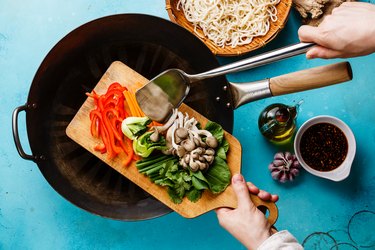Does Cooking Spinach Remove Nutrients

Vegetables lose some nutrients when cooked, but that's not always a bad thing.
Image Credit: Lisovskaya/iStock/GettyImages
If you've ever wondered whether cooking vegetables causes nutrient loss, you're not alone. It's one of the most-searched queries about kitchens and nutrition.
To better understand the effect of cooking on nutrients, it's important to understand how each aspect of meal prep contributes to the overall nutritional output of veggies.
Tip
Vegetables lose some nutrients when cooked, but that's not always a bad thing.
Preparation Affects Vegetable Nutrition
According to a review published in the April 2016 issue of the International Journal of Gastronomy and Food Science, the ways in which you both cook and prep vegetables play a role in how nutritious the vegetables are when consumed. This means that everything from slicing, soaking and sous-vide cooking, to steaming, baking and broiling; all have an effect on how healthy the vegetables are when actually consumed.
More specifically, the review indicates that an onion's pungency increases during chopping (hence onion-induced tears), steaming is the best way to maintain nutritional quality (including TAC, carotenoids, glucosinolates and more), cooking and baking onions improves their flavonols content, soaking and cooking veggies helps remove anti-nutrients such as tannins and acid phytic, boiling helps retain folate content in vegetables and so on.
Adding more vegetables to your diet is a great way to increase the variety of nutrition that you receive from food. By varying the way you cook your vegetables, you can customize the nutritional load that they provide, somewhat, allowing you to focus on consuming the specific nutrients that your body currently needs.
Vegetables Lose Nutrients When Cooked?
While vegetables lose some nutrients (like water-soluble vitamins C and B, as well as enzymes) when cooked, that doesn't mean you should only consume raw veggies. According to a September 2018 article published by the Food Revolution Network, cooking vegetables can actually be pretty beneficial.
For one, when you cook vegetables, it can actually enhance certain nutrients that are otherwise difficult for your body to process in a raw form — such as beta-carotene (which is good for the skin), lutein (which is beneficial for vision), calcium (which is essential for bone health) and lycopene (which helps protect your heart and fights against cancer).
To put it in perspective, the article points out that, whereas raw spinach only has 30 milligrams of calcium per cup, cooked spinach has a whopping 245 milligrams. The piece points out other vegetables that may be more nutritious when cooked, including asparagus, beans, carrots, celery, mushrooms, potatoes and tomatoes.
In fact, according to an August 2014 article published by the Health Sciences Academy, cooked tomatoes have 35 percent more cancer-fighting lycopene than their raw counterparts.
Cook for Nutrients
The best way to cook vegetables to preserve nutrients comes down to the type of vegetables you're cooking in the first place. Are they fresh or frozen?
If you prefer your vegetables cooked, it's important to know that the way in which you cook them can greatly affect their nutritious benefits. For example, the researchers in the August 2014 Health Sciences Academy article found that pressure-cooking and boiling vegetables leads to the greatest antioxidant loss. Grilling, microwaving and baking, on the other hand, were touted as methods that cause the lowest nutritional losses.
It's worth noting, however, that these findings vary for some vegetables. Where broccoli loses the majority of its chlorophyll and vitamin C with every cooking method besides steaming, carrots lose their polyphenols when boiling, but enhance their carotenoid levels. In other words, when determining how to cook your vegetables, it's essential to understand that, no matter what method you choose, you're going to win some and lose some when it comes to nutrition.
If you find yourself stocking up on frozen vegetables to help meet your nutritional quota, keep in mind that steamable microwave bags are your best bet when it comes to cooking them. According to a study featured in the October 2015 issue of the Journal of Innovative Food Science & Emerging Technologies, steamable bags are equal to traditional steaming and better than steam-free microwaving.
Not only will steaming frozen veggies help maintain the texture and firmness of the food at hand, but it will also help retain the ascorbic acid content and increase antioxidant properties within the vegetables.
Fresh, Frozen or Canned?
According to a study published in February 2014 in the American Journal of Lifestyle Medicine, fresh, frozen and canned vegetables are all nutritious. While fresh veggies are the ideal, given they have the highest nutritional value, this evidence suggests that packaged vegetables still offer notable health benefits, making them a cost-effective way to incorporate the essential nutrients into a balanced daily diet.
Fresh, raw veggies are known for their high nutritious quality, but, more than that, they're said to be most beneficial for overall health and mental wellbeing. According to a research article that appeared in the April 2018 issue of the journal Frontiers in Psychology, eating raw vegetables helps reduce feelings of depression and promotes a better mood, feelings of life satisfaction and overall flourishing.
Processed veggies, on the other hand, only lead to a higher positive mood. When conducting this research, the study practitioners found that carrots, dark leafy greens, lettuce and cucumbers (which are technically a fruit but commonly considered a vegetable) are among the top 10 raw foods, alongside bananas, apples, grapefruit, citrus fruits, fresh berries and kiwifruit.
Does Cooking Spinach Remove Nutrients
Source: https://www.livestrong.com/article/465595-do-vegetables-lose-nutrients-when-cooked/
Posted by: saxontiontems.blogspot.com

0 Response to "Does Cooking Spinach Remove Nutrients"
Post a Comment